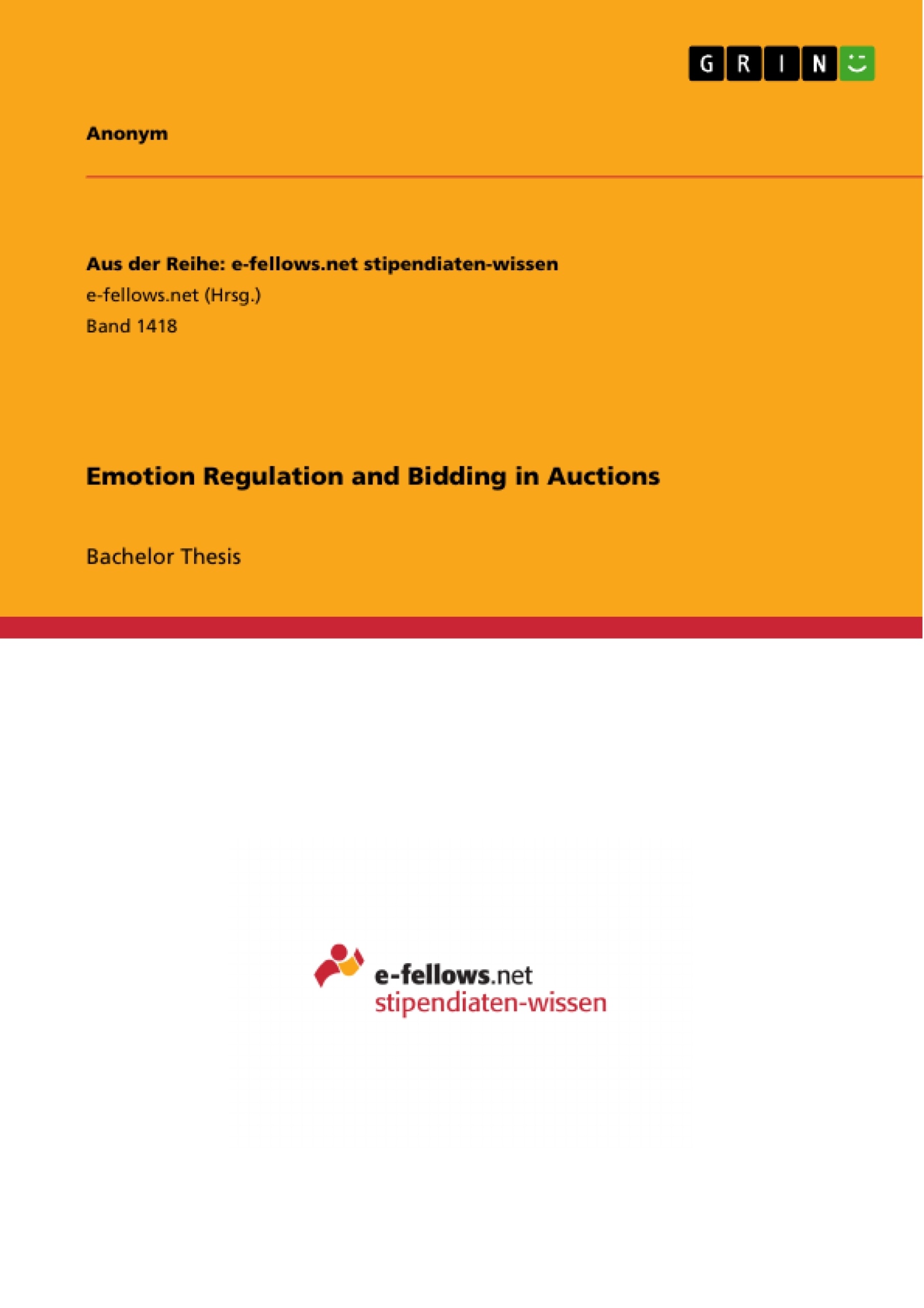“Emotion has taken the center stage in decision theory, and with it emotion regulation promises to play an increasingly prominent role in psychology, economics and cognitive neuroscience”. This quotation from Heilman, Crisan, Houser, Miclea and Miu (2010) alludes to the rising interest in the investigation of emotional processing in economics in the last few years and to the recognition of the importance of the connection between emotions, physiology and behavior in economic decision-making. But what is the relation of emotions to economics? Gross and Thompson (2006) state that “emotions arise when an individual attends to a situation and sees it as relevant to his or her goals”. Beside this definition of emotion there exist many other definitions, for example that “emotions reflect the status of one’s ongoing adjustment to constantly changing environmental demands” (Thayer & Lane, 2009) which is relevant in economics. Emotions can impair decision-making and can lead to irrational decisions which are not regarded in common prospect theory (Kahneman & Tversky, 1979).
Emotions are regulated by humans in different ways. Two main emotion regulation strategies are pointed out by Gross and John (2003): cognitive reappraisal and expressive suppression which intervene in the emotion generative process at different points of time. The emotion regulation depends on an individual’s ability to adjust physiological arousal on a momentary basis (Appelhans & Luecken, 2006). This is reflected by the resting heart rate variability (HRV) as an objective measure for individual differences in regulated emotional responding. HRV is considered a measure of heart-brain interactions and the flexible dynamic regulation of the autonomic nervous system (McCraty & Childre, 2010) as well as a sensitive indicator of inhibitory control mechanisms relevant for decision-making (Sütterlin, Herbert, Schmitt, Kübler & Vögele, 2011a). Because of their influence in economics it is important to better understand cognitive processes and that can be achieved by physiological measurements of HRV which give an objective insight in the emotional processing of individuals. Physiological parameters like skin conductance and heart rate are related to economic decision-making. Studies have already shown that physiological arousal can be a predictor for decision-making behavior (Adam, Gamer, Hey, Ketter & Weinhardt, 2009). [...]
Inhaltsverzeichnis (Table of Contents)
- 1 Introduction
- 2 Emotion regulation.
- 2.1 Basic principles by Gross
- 2.1.1 Emotion regulation strategies
- 2.1.2 Effects and consequences
- 2.1.3 Psychophysiological measures
- 2.2 Heart rate variability (HRV)
- 2.2.1 Emotions and heart rhythm patterns
- 2.2.2 Physiological basics of HRV.
- 2.2.3 HRV analysis..
- 2.3 Existing experimental studies in economics.
- 2.3.1 The Ultimatum Game
- 2.3.2 The Framing Effect.
- 2.3.3 Decision-making under risk and uncertainty ..
- 2.3.4 Auctions and financial market.
- 2.3.5 Overview.
- 3 Experimental results
- 3.1 Experiments..
- 3.1.1 All experiments......
- 3.1.2 Regret experiment....
- 3.1.3 Emotion induction experiment..\li>
- 3.1.4 Human versus computer experiment ..
- 3.2 Discussion.
- 4 Conclusion and outlook
Zielsetzung und Themenschwerpunkte (Objectives and Key Themes)
This bachelor thesis explores the relationship between emotion regulation and bidding behavior in auctions. It aims to investigate the impact of emotional processing on economic decision-making, particularly in the context of auctions. The study focuses on the role of heart rate variability (HRV) as an objective measure of emotional regulation and its influence on bidding behavior.
- The influence of emotion regulation strategies on economic decision-making.
- The role of heart rate variability (HRV) as a physiological measure of emotional regulation.
- The impact of emotional states on bidding behavior in auctions.
- The relationship between emotional processing and cognitive processes in economic decision-making.
- The potential applications of physiological measurements in understanding economic behavior.
Zusammenfassung der Kapitel (Chapter Summaries)
The thesis begins with an introduction that highlights the growing interest in understanding the role of emotions in economic decision-making. It discusses the concept of emotion regulation and its significance in economics, emphasizing the importance of physiological measures like HRV in providing insights into emotional processing.
Chapter 2 delves into the theory of emotion regulation, focusing on the work of Gross and John. It explores different emotion regulation strategies, their effects, and the role of psychophysiological measures, particularly HRV. The chapter then examines the physiological basics of HRV and its relevance in economic decision-making, citing research on the Ultimatum Game, the Framing Effect, and decision-making under risk and uncertainty.
Chapter 3 presents the experimental results of the study, which investigated the impact of emotion regulation on bidding behavior in auctions. The chapter describes the different experiments conducted, including those on regret, emotion induction, and human versus computer interaction.
Frequently Asked Questions
What is the main focus of the study regarding auctions?
The study explores the relationship between emotion regulation strategies and bidding behavior in auctions, investigating how emotional processing affects economic decision-making.
What role does Heart Rate Variability (HRV) play in this research?
HRV is used as an objective physiological measure of an individual's ability to regulate emotions and inhibitory control mechanisms relevant to decision-making.
Which two emotion regulation strategies are primarily discussed?
The research focuses on cognitive reappraisal and expressive suppression, as defined by Gross and John (2003).
How do emotions affect economic rationality according to the text?
Emotions can impair decision-making and lead to irrational decisions that are often not accounted for in traditional prospect theory.
What specific economic games or effects are cited in relation to HRV?
The thesis references research on the Ultimatum Game, the Framing Effect, and decision-making under risk and uncertainty.
What physiological parameters are linked to economic behavior?
Beside heart rate variability, parameters like skin conductance and general heart rate are related to how individuals make economic choices.
- Quote paper
- Anonym (Author), 2012, Emotion Regulation and Bidding in Auctions, Munich, GRIN Verlag, https://www.grin.com/document/300838



